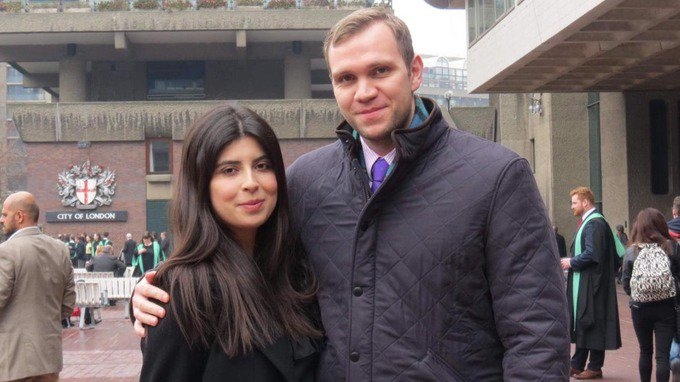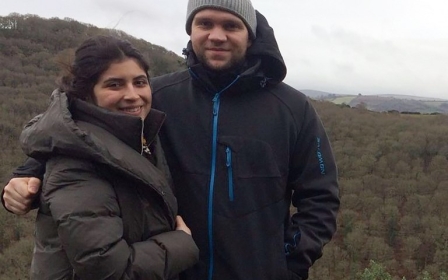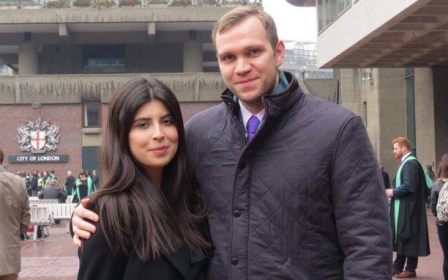UAE hopes for 'amicable solution' to jailed Briton case

The United Arab Emirates (UAE) hopes to find an "amicable solution" to the case of a British academic sentenced to life in jail for spying, the country's foreign ministry has said.
"The UAE is determined to protect its important strategic relationship with a key ally," the ministry said in a statement on Thursday, a day after PhD student Matthew Hedges was sentenced.
"Officials from both countries have discussed the matter regularly over recent months.
"Both sides hope to find an amicable solution to the Matthew Hedges case," it said.
Hedges was researching the UAE's foreign and internal security policies after the Arab Spring revolutions of 2011, studies that Britain insisted were entirely innocuous.
In a verdict that shocked his family, Hedges was sentenced to life in prison on Wednesday for "spying," after a five minute hearing during which no lawyer was present.
Hedges, a student at Durham University, was allowed a formal appeal against his jail term within 30 days of his sentencing.
UK Foreign Secretary Jeremy Hunt spoke to Sheikh Abdullah bin Zayed, the UAE's foreign minister, late on Thursday, in what said had been "a constructive conversation".
Hunt tweeted: "I believe he is working hard to resolve the situation as soon as possible. We have a close partnership with the UAE which will help us to take things forward."
Talk of a possible resolution to the matter may centre around a pardon.
The UAE often grants several pardons on its National Day which is next week.
The UAE's ambassador in London, Sulaiman Almazroui, was expected to issue a statement on the matter at 1000 GMT on Friday, the BBC said.
'Deeply shocked'
On Wednesday, Hunt said he was "deeply shocked" by the sentence, while Prime Minister Theresa May said she was "deeply disappointed" and had instructed the foreign office to "continue to press this matter at the highest level with the Emiratis".
Hunt also tweeted: "UAE claim to be friend & ally of the UK so there will be serious diplomatic consequences. Unacceptable."
The UAE's foreign ministry said on Thursday that there was "compelling and powerful evidence" against the 31-year-old, who was arrested at Dubai airport on May 5.
"That included information extracted from his personal electronic devices by expert forensic analysis techniques; evidence provided by UAE intelligence agencies; witness testaments and Mr Hedges' own confession," said the statement.
On Thursday, Daniela Tejada, Hedges' wife, said her husband was innocent and that she blamed the UK government for failing to help her husband.
University and Colleges Union (UCU) members at Birmingham University, which has a campus in Dubai, announced on Thursday that they had voted not to accept any work there.
"UCU members at the University of Birmingham are outraged at the sentence of Matthew Hedges and the university's refusal to address the serious issues we have raised regarding its campus in
Dubai," said UCU Birmingham branch president James Brackley, also referring to a decision taken at the Dubai campus to water down a committment to LGBT rights.
"The university must now engage meaningfully with us to provide guarantees about the safety and academic freedom of staff and students in Dubai."
However, Dominic Benson, deputy director of communications at Birmingham University, told Middle East Eye on Wednesday that the university's "thoughts were with the family", but that it would not be drawn on whether the news of the arrest would impact the management of the campus.
Benson said that extensive advice already existed on the university's website for students working in Dubai.
New MEE newsletter: Jerusalem Dispatch
Sign up to get the latest insights and analysis on Israel-Palestine, alongside Turkey Unpacked and other MEE newsletters
Middle East Eye delivers independent and unrivalled coverage and analysis of the Middle East, North Africa and beyond. To learn more about republishing this content and the associated fees, please fill out this form. More about MEE can be found here.




